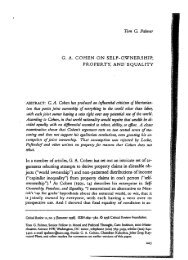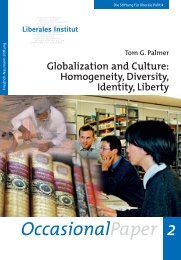Are Patents and Copyrights Morally Justified? - Tom G. Palmer
Are Patents and Copyrights Morally Justified? - Tom G. Palmer
Are Patents and Copyrights Morally Justified? - Tom G. Palmer
Create successful ePaper yourself
Turn your PDF publications into a flip-book with our unique Google optimized e-Paper software.
No. 3] <strong>Are</strong> <strong>Patents</strong> <strong>and</strong> <strong>Copyrights</strong> <strong>Morally</strong> justified? 859<br />
case the association of self to labor to product is more<br />
prominent.<br />
Hume proposes a thought experiment: “Suppose a German,<br />
a Frenchman, <strong>and</strong> a Spaniard to come into a room, where there<br />
are plac’d upon the table three bottles of wine, Rhenish, Burgundy<br />
<strong>and</strong> Port; <strong>and</strong> suppose they shou’d fall a quarrelling<br />
about the division of them; a person, who was chosen for umpire,<br />
wou’d naturally, to shew his impartiality, give every one<br />
the product of his own country. . . . [T]here is first a natural<br />
union betwixt the idea ofthe person <strong>and</strong> that of the object, <strong>and</strong><br />
afterwards a new <strong>and</strong> moral union produc’d by that right or<br />
property, which we ascribe to the person.” 55 This seems to be<br />
a sensible solution that the three drinkers might also arrive at<br />
themselves.<br />
Now suppose that the things to be divided must be produced<br />
by the three persons <strong>and</strong> are not merely found ath<strong>and</strong>. Is it not<br />
more reasonable to suppose that they will insist on a division of<br />
the product that recognizes the separate contributions ofeach,<br />
rather than, say, equal division or, as in the case of the wine,<br />
division by national origin? Further, let us suppose that the<br />
problem is faced, not by three laborers who know each other<br />
immediately <strong>and</strong> are engaged in a joint enterprise, but is a<br />
problem faced by members of an extended order who, while<br />
necessarily dependent upon each other for sustenance, have no<br />
knowledge whatsoever of each other.’~Is it not even more<br />
reasonable to suppose that they will converge, not on some<br />
principle of even distribution, or ofdistribution to the most deserving<br />
(desert having, as noted earlier, no principle), but that<br />
each be awarded his “own” product, that is, what he produces?<br />
(In a market system, this need not bear any close relationship<br />
to the “amount of labor” that might have been expended, but<br />
to what can be claimed on the basis of self-ownership rights<br />
<strong>and</strong> mutually satisfactory agreements among contracting<br />
parties.)<br />
Such a system of self-ownership <strong>and</strong> derived ownership of<br />
tangible objects provides the foundation for a society <strong>and</strong> econ-<br />
153. Id. at 509-10.<br />
154. By “extended order” I mean what Adam Smith referred to as a “Great Society.”<br />
This is asort oforder that extends beyond the small group to include individuals<br />
who, while part of the same economic or legal order, will neverhaveany face-to-face<br />
relationships.











